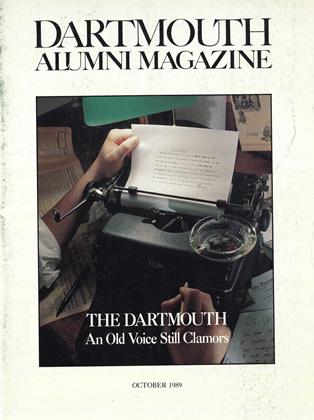The hardware has changed a lot at The Dartmouth since 1939 computers instead of Royals but has the software changed, the writing talent inside the heads of today's editors and reporters?
"Markedly," replies English Professor Don Pease. "Damn near insipid," counters Tom Braden '40, former editor in chief of The Dartmouth, former Dartmouth English professor, former College trustee, and syndicated columnist.
"Student writing has improved vastly since I came here in 1973," says Pease, who attributes the change to better teaching in elementary and secondary schools. "For a while there they didn't teach composition, spelling, grammar—just conversation, and talking is not equivalent to writing."
Braden, on the other hand, goes back earlier for his comparison. When we asked him to read some recent issues, he had this assessment: "There are good, solid ideas for news stories. But the writing, particularly on the editorial page, has no punch. They're not good writers yet." Perhaps Braden's most damning remark: "I can't imagine today's D being a voice of influence."
Most literary comparisons are an individual matter, so we invite you to compare some excerpts arbitrarily lifted from The Dartmouth op-ed pages of 1939 and 1989. (You'll know which came from when.)
"The floats that paraded around the track were well-conceived, the skits were clever, the competition was keen but clean. Until someone discovered that you could get away with a lot of smut in the name of good clean fun."
"Basically, the argument from which all the other anti-choice arguments stem is "fetus rights." From the moment of conception, opponents of choice hold that the fetus has as many rights as its mother. They feel that the fetus has a right to life. In their opinion, the fetus, once conceived, is entitled to every right and freedom established under our constitution."
"Richard Hovey would have had a bad time with the first snow, and so far as we know, he never wrote about it. For there was none of the great moving Spirit of the North, none of the lyric, and none of the song by the fire in Hanover last night. It was just a warm evening, with the first snow coming down softly and slowly, clinging to the trees, as it may not do again all year, and to the clothes of people who went out to walk and stopped, as though to look at pictures."
"I don't want to be pushy, I know girls who are so fed up that they are demanding that guys ask them to dinner or at least comment on their charm before comparing tan lines. I'm not disgusted or fed up or outraged, just a little bored. Let's go, fellas, make us think."
"Bataan fell yesterday. Yesterday Japanese war planes opened an attack on Ceylon, the hub of the supply lines to and from India and the Orient. Yesterday, sweating, sand-stung British soldiers were counter-attacking in Libya and waiting for a new German drive on Suez."
"With a price tag of nearly $530 million per plane and a projected cost of $70 billion before the project is over, every little step taken successfully is being hailed as a major triumph to overshadow the cost overruns and time delays that have followed the plane since the Carter years. Hence a routine-test is justification for the entire program. Generals can be altogether confusing; even Little Leaguers know that one pitch in the strike zone does not make the entire game." four students responsible for stealing $12,000 worth of artwork from the College. We also revealed that the theft was part of a scavenger hunt organized by the Sphinx senior society. The administration did not officially confirm the story until nearly five weeks after it ran, and the deans, who wanted the students to remain anonymous and who had refused to confirm their identities, called me to task for publishing it in the first place. Also last spring, The Dartmouth uncovered the details of how an outspoken advocate of women's issues came to possess an incriminating videotape of a fraternity's membership rituals.
Stories like those may be why more than l,500 students, as well as 500 faculty and administrators, subscribe each term. In addition, many parents and alumni receive a biweekly newsmagazine called Fortnightly, published by The Dartmouth staff. And, God and students willing, they'll read it in years to come.
The paper's directorates like to get a consensus before doing editorials. In the past two years they have come out for delayed rush and against a women's resource center.
Exactly what is it that the writers are pounding into those keyboards?
History major Michael Reynolds '90 plans to do graduate work in medieval paleography.
 View Full Issue
View Full Issue
More From This Issue
-
 Feature
FeatureBoredom's Uses
October 1989 By Joseph Brodsky -
 Cover Story
Cover StoryDon't Call It "The D"
October 1989 By Michael T. Reynolds '90 -
 Feature
FeatureAfter the Massacre
October 1989 By Jessica Smith '89 -
 Feature
FeatureHow I Started Writing Muscular Prose
October 1989 By Chuck Young '88 -
 Feature
FeatureBUBBLE AND PEAK
October 1989 -
 Article
ArticleDR. WHEELOCK'S JOURNAL
October 1989








